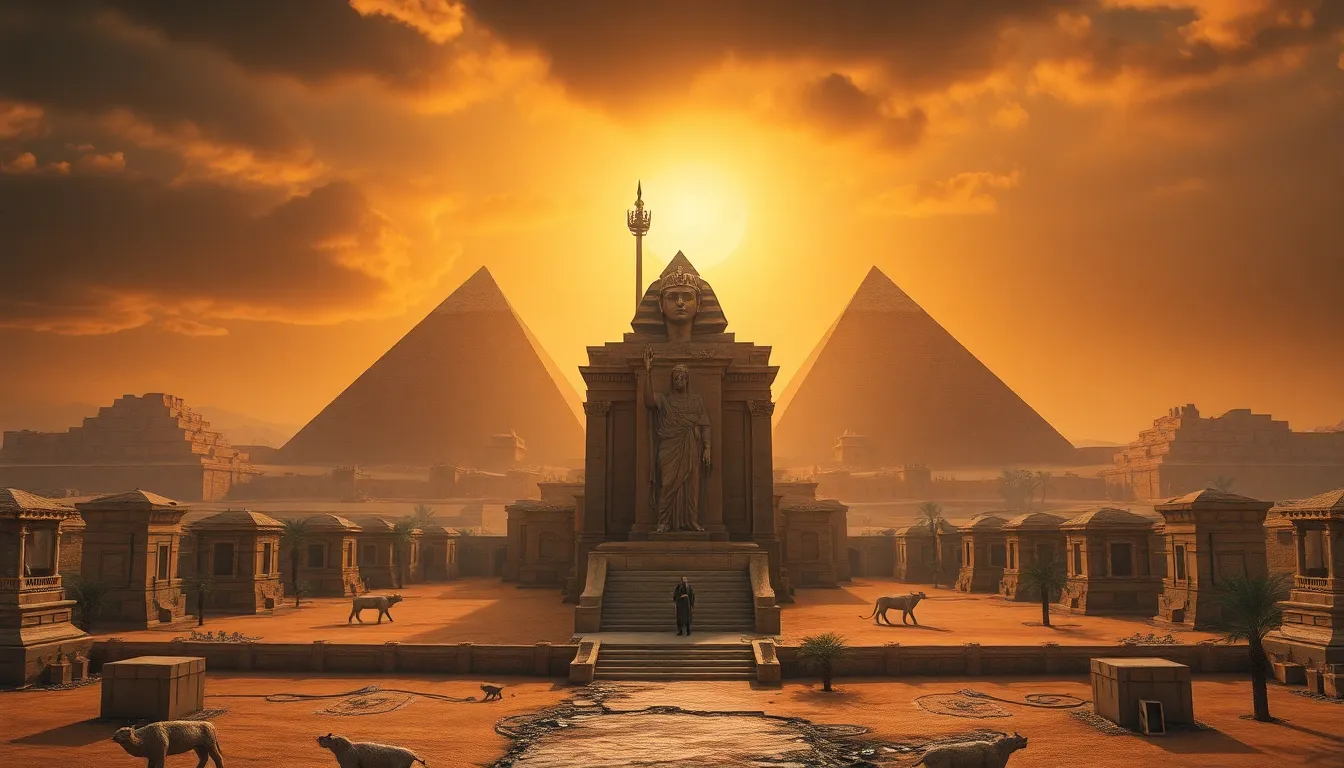The Legacy of Divine Kingship in Modern Egypt
I. Introduction
Divine kingship refers to the political and religious system wherein a ruler is considered a deity or is believed to be chosen by the gods to govern. In ancient Egypt, this concept was integral to the identity of the Pharaohs, who were seen not only as political leaders but also as divine intermediaries between the gods and the people. The historical significance of divine kingship in ancient Egypt shaped the nation’s governance and culture, leaving an indelible mark that persists in modern Egyptian identity and politics. This article will explore the legacy of divine kingship and its ongoing influence on contemporary Egypt.
II. Historical Context of Divine Kingship in Ancient Egypt
The Pharaohs of ancient Egypt were revered as divine rulers, embodying the political and spiritual authority over their subjects. Their role was multifaceted, encompassing governance, military leadership, and religious duties. Central to their rule was the belief that they were descendants of the gods, particularly Horus, and, upon death, they would join the ranks of the divine.
Key beliefs and rituals associated with divine kingship included:
- Coronation Ceremonies: These involved sacred rituals that symbolized the Pharaoh’s divine right to rule.
- Temple Building: Pharaohs constructed magnificent temples dedicated to the gods, reinforcing their divine status.
- Mortuary Practices: Elaborate burial rites ensured the Pharaoh’s safe passage to the afterlife, affirming their eternal divinity.
The intertwining of religion and governance in ancient Egyptian society was evident in every aspect of life, as the Pharaoh was seen as a living god whose actions were vital for the prosperity and stability of the nation.
III. Transition from Divine Kingship to Modern Governance
The decline of the Pharaohs began with foreign invasions and the fragmentation of the kingdom. The conquest by the Assyrians, Persians, and later the Greeks and Romans marked significant shifts in governance, leading to the rise of new political structures. The monarchy, once revered and powerful, was eventually abolished in the early 20th century as Egypt transitioned to a republic.
- Impact of Foreign Invasions: Each invasion altered the political landscape and diminished the Pharaoh’s divine authority.
- Modern Political Structures: The establishment of parliamentary systems and presidential governance shifted the focus from monarchy to democratic principles.
- Abolition of the Monarchy: In 1952, the monarchy was officially abolished, leading to the establishment of a republic under the leadership of Gamal Abdel Nasser.
IV. Cultural Remnants of Divine Kingship in Contemporary Egypt
Despite the transition to modern governance, the influences of ancient beliefs remain deeply embedded in Egyptian culture and identity. The legacy of divine kingship continues to manifest in various aspects of contemporary life:
- Art and Literature: Modern Egyptian artists and writers often draw upon ancient mythology and symbolism to express national identity and cultural heritage.
- Festivals and Rituals: Certain festivals, though transformed, echo ancient practices, celebrating the connection to Egypt’s rich history.
The enduring presence of these cultural remnants reinforces the significance of ancient beliefs in shaping modern Egyptian society.
V. Political Implications of Divine Kingship Legacy
Modern Egyptian leaders have sometimes invoked the imagery of divine kingship to consolidate power and legitimize their rule. The relationship between religion and state remains complex, influencing contemporary politics in various ways:
- Divine Imagery: Political figures have utilized religious symbolism to present themselves as protectors of faith and the nation.
- Religion and State: The intertwining of Islam and governance creates a dynamic where leaders often appeal to religious sentiments.
Case studies reveal how some political figures have explicitly linked their authority to divine sanction, echoing the divine kingship of the Pharaohs.
VI. Social Perspectives on Divine Kingship
The public perception of the legacy of divine kingship varies across different segments of Egyptian society. Education and historical narratives play a crucial role in shaping these views:
- Historical Narratives: The ways in which history is taught can influence national pride and the collective memory surrounding the Pharaohs.
- National Pride: Many Egyptians take pride in their ancient heritage, seeing the Pharaohs as symbols of national identity.
These perspectives contribute to a complex relationship with the past, where the legacy of divine kingship is both revered and critically examined.
VII. Comparative Analysis with Other Cultures
Divine kingship is not unique to ancient Egypt; similar concepts can be found in other civilizations, such as Mesopotamia and Japan. A comparative analysis reveals:
- Similarities: In both Mesopotamia and Japan, rulers were often seen as divine or semi-divine figures, believed to have a unique connection with the gods.
- Differences: The specific rituals, titles, and cultural contexts surrounding divine kingship vary significantly across these cultures.
The global influence of these concepts has also impacted modern political systems, showcasing the enduring nature of divine authority in governance.
VIII. Conclusion
The legacy of divine kingship in Egypt has left an enduring imprint on the nation’s identity, culture, and politics. From the ancient Pharaohs to contemporary leaders, the intertwining of the divine and governance continues to shape Egyptian society. Understanding this legacy is crucial for appreciating the complexities of modern Egypt, where historical narratives inform political discourse and national pride. As Egypt moves forward, the implications of this legacy will undoubtedly continue to influence its cultural and political landscape.




